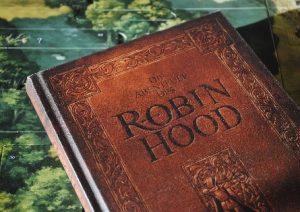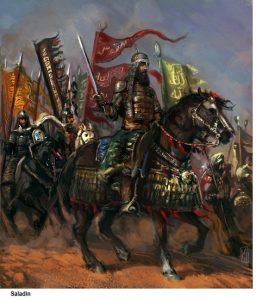Social Justice Warrior
 Robin Hood is a legendary, heroic outlaw originally depicted in English folklore and subsequently featured in literature and film. According to legend, he was a highly skilled archer and swordsman of noble birth who fought in the Crusades before returning to England to find his lands taken by the Sheriff.
Robin Hood is a legendary, heroic outlaw originally depicted in English folklore and subsequently featured in literature and film. According to legend, he was a highly skilled archer and swordsman of noble birth who fought in the Crusades before returning to England to find his lands taken by the Sheriff.
On October 2nd, 1187, Jerusalem was captured by Saladin, Sultan of the Islamic Empire of Egypt and Syria. Christians lost access to the Holy City, so when in 1189 Richard the Lionheart, a great military leader and warrior, the third of five sons of King Henry II of England, assumed the throne he swore an oath to renounce his past wickedness. To show himself worthy of Kingship he started to amass money to raise an army of crusaders. He spent most of his father’s treasury, sold the right to hold official positions, lands, and other privileges to those interested in them, and even agreed to free King William I of Scotland from his oath of subservience to Richard in exchange for £6,500. In 1190 he left England and joined Philip II of France and Frederick I of Holy Roman Empire in an attempt to secure passage for Christian pilgrims to the Holy Land and Jerusalem.
most of his father’s treasury, sold the right to hold official positions, lands, and other privileges to those interested in them, and even agreed to free King William I of Scotland from his oath of subservience to Richard in exchange for £6,500. In 1190 he left England and joined Philip II of France and Frederick I of Holy Roman Empire in an attempt to secure passage for Christian pilgrims to the Holy Land and Jerusalem.
In Richard’s absence, his younger brother Prince John forced himself on England. As the new ruler he imposed high taxes on the population with exemptions for his own supporters, and prosecuted those who couldn’t pay them. Often, he would confiscate their property and brutally crush any form of resistance. Many people fled their homes to seek safety in the hard to access parts of Sherwood Forest.
 Meanwhile, in 1192 after recapturing the important cities of Acre and Jaffa, King Richard forced Saladin to sign a truce providing unarmed Christian pilgrims and merchants access to Jerusalem which ended the Third Crusade. King Richard, being ill with Arnaldia, left for England on 9 October 1192. He sailed from Corfu with four attendants, but his ship was wrecked near Aquileia, forcing him onto a dangerous land route through central Europe. He was captured shortly before Christmas 1192 near Vienna by Leopold of Austria. The detention of a crusader was contrary to public law and on these grounds Pope Celestine III excommunicated Duke Leopold. Thus Leopold, on 28 March 1193, handed over Richard to the Holy Roman Emperor Henry VI. The emperor demanded that 150,000 marks (about three times the annual income for the English Crown) be delivered to him before he would release the King. At the same time John, Richard’s brother, and King Philip of France offered 80,000 marks to Henry VI to hold Richard prisoner until fall 1194. Finally, on 4 February 1194 King Richard was released. This is why in the story, Sir Robin of Locksley returned to England from the Crusade long before King Richard. As a just, honorable young noble man he quickly got in trouble with the henchmen of Prince John, the Sheriff of Nottingham. Forced to seek refuge in the forest he joined other outlaws like himself and became their leader. With these “Merry Men,” he would rob tax collectors and return the money to the rightful owners, the overburden taxpayers. In the story, traditionally depicted dressed in Lincoln green, Robin was about
Meanwhile, in 1192 after recapturing the important cities of Acre and Jaffa, King Richard forced Saladin to sign a truce providing unarmed Christian pilgrims and merchants access to Jerusalem which ended the Third Crusade. King Richard, being ill with Arnaldia, left for England on 9 October 1192. He sailed from Corfu with four attendants, but his ship was wrecked near Aquileia, forcing him onto a dangerous land route through central Europe. He was captured shortly before Christmas 1192 near Vienna by Leopold of Austria. The detention of a crusader was contrary to public law and on these grounds Pope Celestine III excommunicated Duke Leopold. Thus Leopold, on 28 March 1193, handed over Richard to the Holy Roman Emperor Henry VI. The emperor demanded that 150,000 marks (about three times the annual income for the English Crown) be delivered to him before he would release the King. At the same time John, Richard’s brother, and King Philip of France offered 80,000 marks to Henry VI to hold Richard prisoner until fall 1194. Finally, on 4 February 1194 King Richard was released. This is why in the story, Sir Robin of Locksley returned to England from the Crusade long before King Richard. As a just, honorable young noble man he quickly got in trouble with the henchmen of Prince John, the Sheriff of Nottingham. Forced to seek refuge in the forest he joined other outlaws like himself and became their leader. With these “Merry Men,” he would rob tax collectors and return the money to the rightful owners, the overburden taxpayers. In the story, traditionally depicted dressed in Lincoln green, Robin was about fighting the high taxation imposed by Prince’s John dictatorial, brutal administration/government.
fighting the high taxation imposed by Prince’s John dictatorial, brutal administration/government.
Today we have numerous people portraying themselves as Robin Hoods. Modern Robin Hoods are screaming from the tops of their lungs, “tax the rich, tax the corporations, make them pay their fair share” and promoting opinion that “Robin Hood stole from the rich and gave to the poor.”
Sadly, the high taxation imposed by prince John in the twelfth century and by modern “Robin Hoods” is ultimately harming the poor the most.
To maintain their wealth, the rich must constantly work to restore their capital, otherwise they would expend their wealth over time, and like many lottery winners fall into poverty. This is why modern Robin Hoods want to tax the income of wealthy people. Siphoning their income creates a steady flow of money to the government and forces the wealthy to adjust, not only their personal spending habits, but also the habits of businesses they are involved with. The increased burden on businesses stagnates the economy, which hurts average people the most. Some of them, especially employees of small businesses, will experience a loss of income, others may lose their job and are forced to seek a new career. Similarly, raising taxes on corporations forces them to adapt and change the way they conduct business. To survive, some will outsource production or move their headquarters to countries with lower taxes, other will have to raise the prices of their products, some will go out of business. Again, the poor are the ones hurt the most. When a factory closes or an entire company goes bankrupt, when the prices of items in the stores rises while household income does not, the poor suffer.
Sadly, modern Robin Hoods, who are robbing the rich and giving to the governmental bureaucracy, are never blamed for the poverty they create and sustain by raising taxes. They pit the poor majority against the wealthy minority to secure permanent influential positions in leadership, becoming governors, congressmen, senators, etc. They receive royal treatment from the rich and corporations who are forced to pay them protection money by donating to re-election funds, hiring family members of politicians to lucrative positions, and donating to designated foundations, paying favor for favor. The loudest among these politicians usually end their careers with more money in their bank accounts than they made during their entire term.
At the same time, among the electorate they are glorified as a social justice warriors/ Robin Hoods helping poor people get back at the evil rich.
The Legendary Robin Hood cared for the poor people and for his country. Modern robin hoods care for themselves, crushing the country and dividing its people.